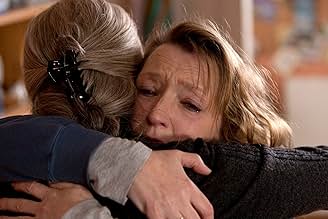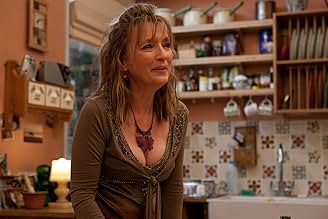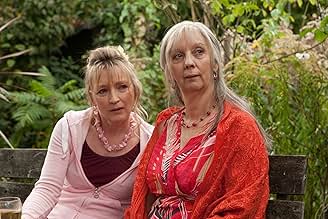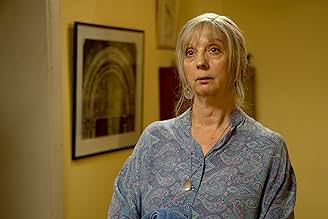AVALIAÇÃO DA IMDb
7,4/10
32 mil
SUA AVALIAÇÃO
Uma análise das quatro estações da vida de um casal feliz e seus relacionamentos com a família e amigos.Uma análise das quatro estações da vida de um casal feliz e seus relacionamentos com a família e amigos.Uma análise das quatro estações da vida de um casal feliz e seus relacionamentos com a família e amigos.
- Direção
- Roteirista
- Artistas
- Indicado a 1 Oscar
- 23 vitórias e 57 indicações no total
Avaliações em destaque
Another Year is the kind of film an actor wishes they had been in and any director wishes they had made. Mike Leigh's skillful directing is at its peak. Long, lingering shots of the characters angst (which normally frustrate the audience) are achieved in an effortless way. The acting is so flawless that it is difficult to find fault. The story is simple and meandering...but it works, and works incredibly well. Another Year will not be to the taste of the young kick-cutting action packed generation. It requires a mature audience or an audience that have at least pondered about what their life would be like after their forties.
This will gain nominations and should win Oscars.
This will gain nominations and should win Oscars.
In Mike Leigh's new slice of life, Another Year, a married couple who have managed to remain blissfully happy into their crumbling autumn days are surrounded over the course of the four seasons of one seemingly average year by friends, colleagues, and family, many of whom appear to suffer some degree of unhappiness or at least confusion. The film is nicely segmented into chapters, following the seasons. All of life is there - from birth, to a funeral. Strangely, or conveniently, given the apparently troubled lives all round, She works as a psychotherapist, while He builds things, but both spend their spare time together growing vegetables in their allotment. Mary, the secretary in her clinic, takes over the centre of the story as she gradually moves into more of everyone's lives. Or perhaps it's just that the film gradually opens up the relationship that was already there. Just as it is with all the extra characters. As it's a Mike Leigh film, all the actors will all have been living "in character" for maybe six months before breezing through, stirring up the plot with their back story and emotional infrastructure.
Lesley Manville, as Mary, the lonely and unstable girl of a certain age - 40, going on 17, really steals this in the final part, which gets even more intense than the rest of it. One thing I noticed right away was that adding to the intensity of the Mike Leigh close-ups, it's all shot in high-definition digital. But in the end it's the total effect that works. The apparent non-acting. The marvellous thing about Leigh is the way he shows really ordinary people doing really ordinary things and makes them really important. He is so compassionate towards everyone in his stories. You just can't help caring, too.
Lesley Manville, as Mary, the lonely and unstable girl of a certain age - 40, going on 17, really steals this in the final part, which gets even more intense than the rest of it. One thing I noticed right away was that adding to the intensity of the Mike Leigh close-ups, it's all shot in high-definition digital. But in the end it's the total effect that works. The apparent non-acting. The marvellous thing about Leigh is the way he shows really ordinary people doing really ordinary things and makes them really important. He is so compassionate towards everyone in his stories. You just can't help caring, too.
Tom and Gerri (Jim Broadbent and Ruth Sheen), the couple at the centre of Mike Leigh's latest existential piece, couldn't be more unlike the cartoon characters who share their names. Together for several decades, their love for each other has only grown. I wouldn't complain if my marriage looked like theirs when I'm in my 50s.
When he isn't working as a geologist and she isn't counselling people, they spend their time providing solace to those who need it – Ken (Peter Wight), a straight-talking, John Smiths-drinking Yorkshireman; Ronnie (David Bradley), Tom's laconic brother whose wife has just died; and most of all Mary (Lesley Manville), a jittery colleague of Gerri's in the middle of a mid-life crisis. It is Mary who dominates the film and who most elicits our empathy. She is without love and possibly even without the hope of love. It is genuinely painful to see her disintegrate scene by scene.
As another year in Tom and Gerri's life unfolds, we see nothing particularly fascinating happen. They tend to their allotment, they invite people to their house for food and company, and they reminisce about their experiences. Nothing could be more trivial, right? Wrong. This film is about growing old and making the right choices as one gets to old age. Above all it's about recognising that happiness is less a right than an aspiration.
The word 'integrity' comes to mind when I think of Mike Leigh. Who else could convince actors to sign up to films where there was no script to begin with? Throughout his career he has eschewed the Hollywood system and has done things his own way ('Given the choice of Hollywood or poking steel pins in my eyes, I'd prefer steel pins').
An audience member expostulated at the end, 'That wasn't very uplifting'. She's correct, but Leigh doesn't offer folly or fantasy. He's a truth-seeking social observer and commentator. What's also appealing about Leigh is that he doesn't spoon-feed his audience. His films compel the watcher to debate what they have seen and draw their own conclusions. Why should films give us answers?
I was moved by this film like no other in recent memory. One moment I was laughing uncontrollably, the next I was holding back tears. The film emphasises a sad fact: for some people, things don't always go according to plan. Sometimes we're just plain unlucky. And that's life.
www.scottishreview.net
When he isn't working as a geologist and she isn't counselling people, they spend their time providing solace to those who need it – Ken (Peter Wight), a straight-talking, John Smiths-drinking Yorkshireman; Ronnie (David Bradley), Tom's laconic brother whose wife has just died; and most of all Mary (Lesley Manville), a jittery colleague of Gerri's in the middle of a mid-life crisis. It is Mary who dominates the film and who most elicits our empathy. She is without love and possibly even without the hope of love. It is genuinely painful to see her disintegrate scene by scene.
As another year in Tom and Gerri's life unfolds, we see nothing particularly fascinating happen. They tend to their allotment, they invite people to their house for food and company, and they reminisce about their experiences. Nothing could be more trivial, right? Wrong. This film is about growing old and making the right choices as one gets to old age. Above all it's about recognising that happiness is less a right than an aspiration.
The word 'integrity' comes to mind when I think of Mike Leigh. Who else could convince actors to sign up to films where there was no script to begin with? Throughout his career he has eschewed the Hollywood system and has done things his own way ('Given the choice of Hollywood or poking steel pins in my eyes, I'd prefer steel pins').
An audience member expostulated at the end, 'That wasn't very uplifting'. She's correct, but Leigh doesn't offer folly or fantasy. He's a truth-seeking social observer and commentator. What's also appealing about Leigh is that he doesn't spoon-feed his audience. His films compel the watcher to debate what they have seen and draw their own conclusions. Why should films give us answers?
I was moved by this film like no other in recent memory. One moment I was laughing uncontrollably, the next I was holding back tears. The film emphasises a sad fact: for some people, things don't always go according to plan. Sometimes we're just plain unlucky. And that's life.
www.scottishreview.net
I have heard a lot o buzz surrounding Another Year, and it is one of the last Oscar-nominated films I had yet to see. So I had a chance to watch it today, not knowing what type of film it would be since I have not seen other Mike Leigh films. It engaged me from it's opening scene to the last.
This is a masterful film, dwelling with it's characters in truly humane and intriguing ways. This is an ensemble cast, and as a whole they were all great. Jim Broadbent and Ruth Sheen are at the center of the film, and the film takes us on a portrayal of their relationship with others. It is to note that the film is contrasting just how different these two main characters' approach life than the people they are surrounded by. The most notable to these other characters is Mary, played by Lesley Manville. I have to say that she gives one of the best performances of 2010, becoming her character. She is vulnerable and at the same time delusional as to her fantasies in life. It's hard to label her performance as leading or supporting. She has a large amount of screen time, but at the same time she serves only as a window looking in to both Sheen and Broadbent's life. She has definitely created one of the most memorable characters in recent memory, and thats largely because of amazing direction and perhaps the best original screenplay of 2010.
Even when Manville is placed in supporting, it is a shame that the Academy went for a more popular actress (Melissa Leo) when Manville and Weaver (Animal Kingdom) both are amazingly much more effective and either deserved to take home that Oscar (what blasphemy that Manville wasn't even nominated). However, this is a rich film, and certainly one of the best of 2010.
This is a masterful film, dwelling with it's characters in truly humane and intriguing ways. This is an ensemble cast, and as a whole they were all great. Jim Broadbent and Ruth Sheen are at the center of the film, and the film takes us on a portrayal of their relationship with others. It is to note that the film is contrasting just how different these two main characters' approach life than the people they are surrounded by. The most notable to these other characters is Mary, played by Lesley Manville. I have to say that she gives one of the best performances of 2010, becoming her character. She is vulnerable and at the same time delusional as to her fantasies in life. It's hard to label her performance as leading or supporting. She has a large amount of screen time, but at the same time she serves only as a window looking in to both Sheen and Broadbent's life. She has definitely created one of the most memorable characters in recent memory, and thats largely because of amazing direction and perhaps the best original screenplay of 2010.
Even when Manville is placed in supporting, it is a shame that the Academy went for a more popular actress (Melissa Leo) when Manville and Weaver (Animal Kingdom) both are amazingly much more effective and either deserved to take home that Oscar (what blasphemy that Manville wasn't even nominated). However, this is a rich film, and certainly one of the best of 2010.
This is a big movie tackling big themes, and may, like Happy-Go-Lucky (Mike Leigh's previous film) prove extremely Marmitish. The latter comment may prove hard to understand if you're not British, and that's just like the film (Marmite is a British spread made from yeast extract with a love-it-or-hate-it umami/savoury/salty flavour). Another Year deals with a particularly British form of social breakdown and emotional constipation.
In Britain, from the 40s to the 70s there was widespread use of an exam system called the 11+. Up until the age of 11-12 students were schooled together, after that point, students considered to have more potential by the standards of the 11+ examinations were streamed separately in Grammar Schools, prepared for success, whilst those below the boundary line were sent to Secondary Modern Schools where the focus was much more on practical education (bricklaying, "home economics", woodwork, etc). The legacy of this system has been huge social resentment. There is a feeling in Another Year that the system is back, in the form of university education. With the UK attempting to educate 50% of the secondary school student population to university level, a socially engineered bifurcation to haves and have-nots is being created once again.
All of the characters in the film are from working class backgrounds and yet the fortunes that life has graced them with are distinctly uneven, they have gone in different directions, absent any idea of a shared experience that may have been the rock of previous generations of Britons. Graduates Tom and Gerri (pun intended) have fulfilling careers, heartfelt love for one another, high incomes, and have had the opportunity to travel widely. Tom's brother and Gerri's friend Mary are aging and alone, undereducated, lacking in the kind of accomplishments that are social currency, living with hurt, and in Mary's case, desperation. The message is not all one way, old friend of the family Ken is also a graduate and yet has not managed to find a place in life either.
Scenes in the movie almost exclusively concern Tom and Gerri's catering to this group of friends and family. They deal with the misfortunes of this circle with a mixture of humour, irony, good cooking and alcohol, but mostly conceal their compassion and are helpless onlookers.
The mating game is key here, the unwedded 40+s exist in a state of unsalved distress, futureless, scrapped. Even 30-year-old Joe, functional, graduate, well-employed and witty has struggled to find someone to be with. A notable absence in the movie is a sense of solidarity, community, public events, shared lives and shared values. There's an illiquidity in the relationships marketplace, a lack of feeling and connection, all leading to a general anomie and social constipation.
However painful the lives of Ken and Mary are, the film gives occasional glimpses of far more infernal lives, lower circles of hell where dissatisfaction has paralysed characters with rage or utter resignation. Anything more than a glimpse would have made the film unwatchable.
Gone are the days when WWII veterans would whimper their way through night-times of post-traumatic hallucination for forty years without mentioning it to a soul, however the British "stiff upper lip" still remains as a guiding principle in this movie. There is still very much the assumption that one should keep one's private hell to oneself, or else outsource emotion to a therapist.
What may be controversial in the film is the way you look at how Tom and Gerri treat Mary. A German lady in the audience voiced her opinion to Mike Leigh that the way they treated her was to look down on her, and that she felt this was inappropriate. Mike Leigh responded that the lady felt like this because she was a German and Germans did not understand irony. Maybe I suffer from the same problem because I for one felt that Mary was treated as little more than a baby, and with a certain hauteur, arms-length love. I think people who are lonely need to feel useful. Mary for example was never allowed to help with anything, though this does not excuse her, at times, appalling behaviour (depression makes people selfish, however I feel it necessary to point out as well that someone who is drowning in a river and calling for a life ring, is also being "selfish" in the same way, and I think metaphorically the position is very similar).
Dour joyless watching, maybe one for the Cabinet to watch, after the example of the film La Haine, which concentrated on French malaise and was screened in front of the French cabinet at the instigation of Prime Minister Alain Juppé.
In Britain, from the 40s to the 70s there was widespread use of an exam system called the 11+. Up until the age of 11-12 students were schooled together, after that point, students considered to have more potential by the standards of the 11+ examinations were streamed separately in Grammar Schools, prepared for success, whilst those below the boundary line were sent to Secondary Modern Schools where the focus was much more on practical education (bricklaying, "home economics", woodwork, etc). The legacy of this system has been huge social resentment. There is a feeling in Another Year that the system is back, in the form of university education. With the UK attempting to educate 50% of the secondary school student population to university level, a socially engineered bifurcation to haves and have-nots is being created once again.
All of the characters in the film are from working class backgrounds and yet the fortunes that life has graced them with are distinctly uneven, they have gone in different directions, absent any idea of a shared experience that may have been the rock of previous generations of Britons. Graduates Tom and Gerri (pun intended) have fulfilling careers, heartfelt love for one another, high incomes, and have had the opportunity to travel widely. Tom's brother and Gerri's friend Mary are aging and alone, undereducated, lacking in the kind of accomplishments that are social currency, living with hurt, and in Mary's case, desperation. The message is not all one way, old friend of the family Ken is also a graduate and yet has not managed to find a place in life either.
Scenes in the movie almost exclusively concern Tom and Gerri's catering to this group of friends and family. They deal with the misfortunes of this circle with a mixture of humour, irony, good cooking and alcohol, but mostly conceal their compassion and are helpless onlookers.
The mating game is key here, the unwedded 40+s exist in a state of unsalved distress, futureless, scrapped. Even 30-year-old Joe, functional, graduate, well-employed and witty has struggled to find someone to be with. A notable absence in the movie is a sense of solidarity, community, public events, shared lives and shared values. There's an illiquidity in the relationships marketplace, a lack of feeling and connection, all leading to a general anomie and social constipation.
However painful the lives of Ken and Mary are, the film gives occasional glimpses of far more infernal lives, lower circles of hell where dissatisfaction has paralysed characters with rage or utter resignation. Anything more than a glimpse would have made the film unwatchable.
Gone are the days when WWII veterans would whimper their way through night-times of post-traumatic hallucination for forty years without mentioning it to a soul, however the British "stiff upper lip" still remains as a guiding principle in this movie. There is still very much the assumption that one should keep one's private hell to oneself, or else outsource emotion to a therapist.
What may be controversial in the film is the way you look at how Tom and Gerri treat Mary. A German lady in the audience voiced her opinion to Mike Leigh that the way they treated her was to look down on her, and that she felt this was inappropriate. Mike Leigh responded that the lady felt like this because she was a German and Germans did not understand irony. Maybe I suffer from the same problem because I for one felt that Mary was treated as little more than a baby, and with a certain hauteur, arms-length love. I think people who are lonely need to feel useful. Mary for example was never allowed to help with anything, though this does not excuse her, at times, appalling behaviour (depression makes people selfish, however I feel it necessary to point out as well that someone who is drowning in a river and calling for a life ring, is also being "selfish" in the same way, and I think metaphorically the position is very similar).
Dour joyless watching, maybe one for the Cabinet to watch, after the example of the film La Haine, which concentrated on French malaise and was screened in front of the French cabinet at the instigation of Prime Minister Alain Juppé.
Você sabia?
- CuriosidadesTo simulate the four seasons of a year, cinematographer Dick Pope used four different film stocks, and much attention was paid to details in the props so that the passage of time would appear believable.
- Erros de gravaçãoOne of Mary's outlays on her troublesome car was for a new carburettor, but the vehicle in the film had fuel injection.
- ConexõesFeatured in At the Movies: Cannes Film Festival 2010 (2010)
- Trilhas sonorasAll Shook Up
Written by Elvis Presley & Otis Blackwell
Used by kind permission of Carlin Music Corp & EMI Publishing
Principais escolhas
Faça login para avaliar e ver a lista de recomendações personalizadas
- How long is Another Year?Fornecido pela Alexa
Detalhes
Bilheteria
- Orçamento
- US$ 8.000.000 (estimativa)
- Faturamento bruto nos EUA e Canadá
- US$ 3.205.706
- Fim de semana de estreia nos EUA e Canadá
- US$ 111.869
- 2 de jan. de 2011
- Faturamento bruto mundial
- US$ 19.722.766
- Tempo de duração2 horas 9 minutos
- Cor
- Mixagem de som
- Proporção
- 2.35 : 1
Contribua para esta página
Sugerir uma alteração ou adicionar conteúdo ausente

Principal brecha
By what name was Um Ano Mais (2010) officially released in India in English?
Responda








































